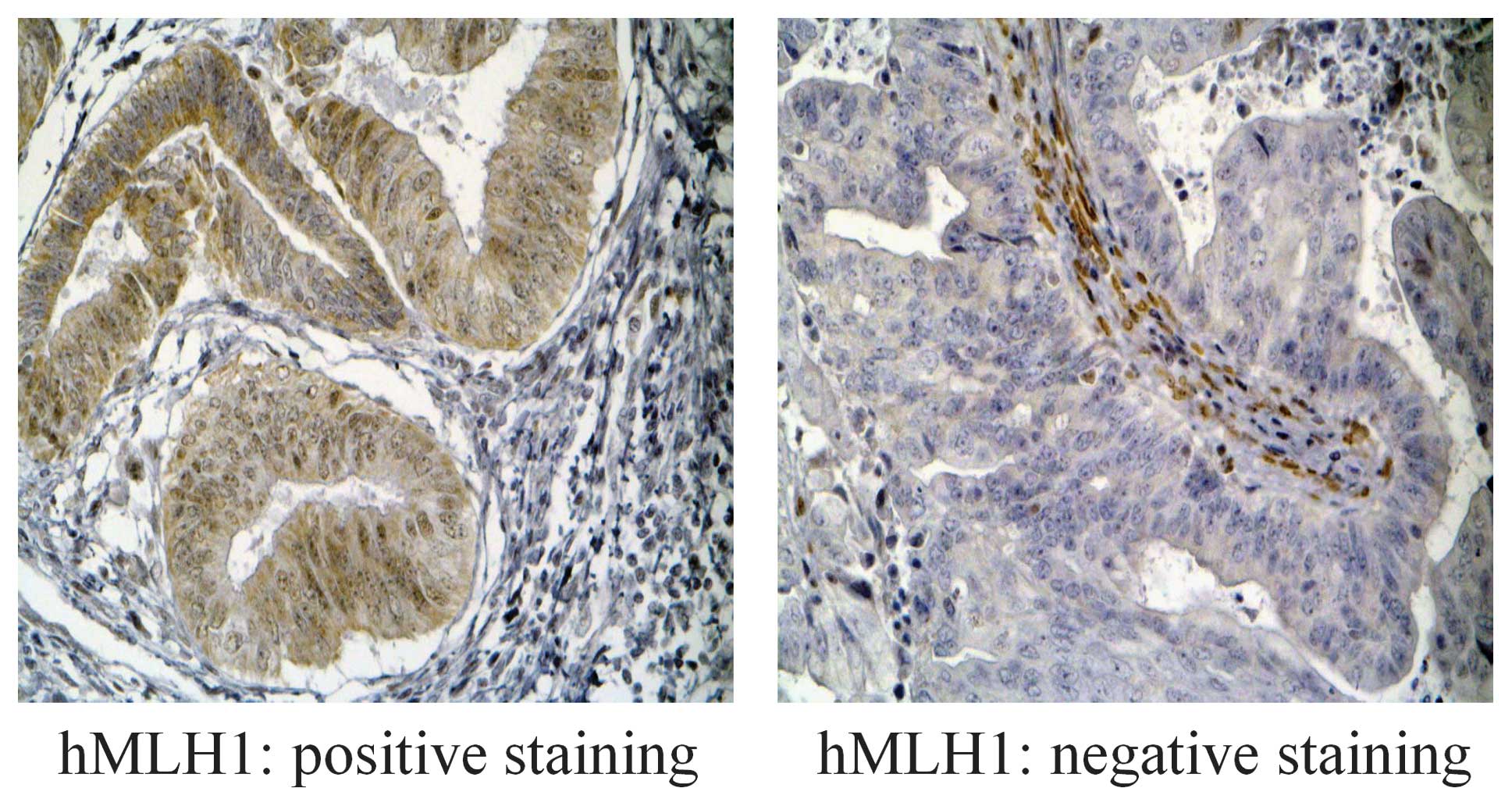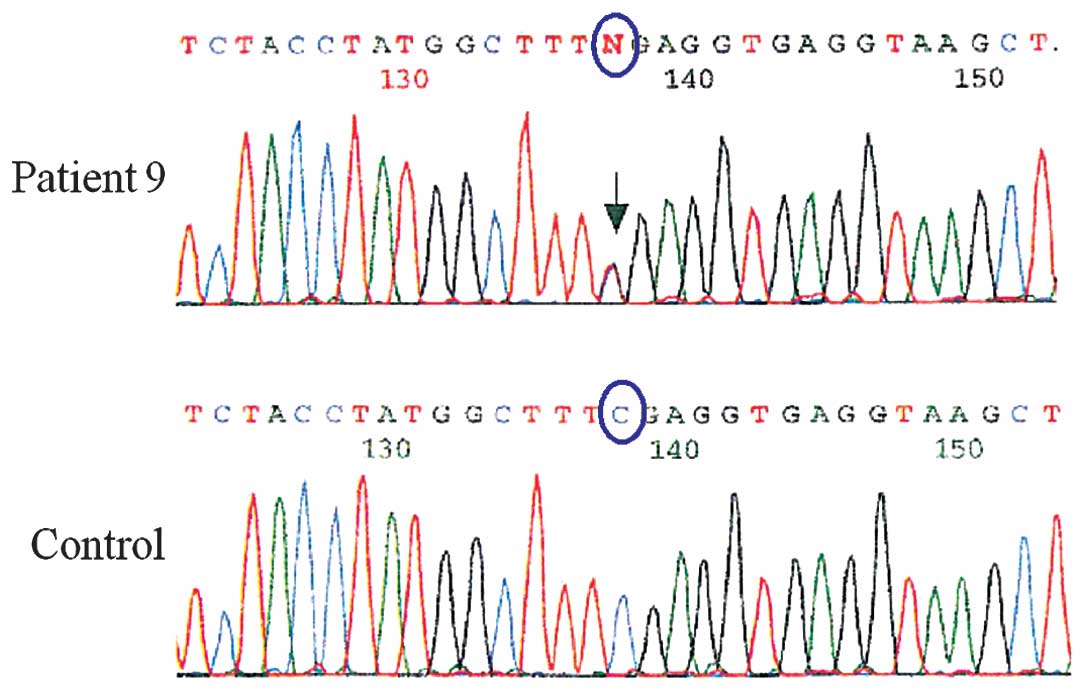|
1
|
Siegel R, Naishadham D and Jemal A: Cancer
statistics. CA Cancer J Clin. 62:10–29. 2012.
|
|
2
|
Forouzanfar MH, Foreman KJ, Delossantos
AM, et al: Breast and cervical cancer in 187 countries between 1980
and 2010: a systematic analysis. Lancet. 378:1461–1484. 2011.
View Article : Google Scholar : PubMed/NCBI
|
|
3
|
Saso S, Chatterjee J, Georgiou E, Ditri
AM, Smith JR and Ghaem-Maghami S: Endometrial cancer. BMJ.
343:3954. 2011. View Article : Google Scholar
|
|
4
|
Brinton LA, Berman ML, Mortel R, et al:
Reproductive, menstrual, and medical risk factors for endometrial
cancer: results from a case-control study. Am J Obstet Gynecol.
167:1317–1325. 1992. View Article : Google Scholar : PubMed/NCBI
|
|
5
|
Gruber SB and Thompson WD: A
population-based study of endometrial cancer and familial risk in
younger women. Cancer and Steroid Hormone Study Group. Cancer
Epidemiol Biomarkers Prev. 5:411–417. 1996.PubMed/NCBI
|
|
6
|
Lynch HT and de la Chapelle A: Hereditary
colorectal cancer. N Engl J Med. 348:919–932. 2003. View Article : Google Scholar : PubMed/NCBI
|
|
7
|
Peltomäki P: Role of DNA mismatch repair
defects in the pathogenesis of human cancer. J Clin Oncol.
21:1174–1179. 2003.PubMed/NCBI
|
|
8
|
Dunlop MG, Farrington SM, Carothers AD, et
al: Cancer risk associated with germline DNA mismatch repair gene
mutations. Hum Mol Genet. 6:105–110. 1997. View Article : Google Scholar : PubMed/NCBI
|
|
9
|
Aarnio M, Sankila R, Pukkala E, et al:
Cancer risk in mutation carriers of DNA-mismatch-repair genes. Int
J Cancer. 81:214–218. 1999. View Article : Google Scholar : PubMed/NCBI
|
|
10
|
Lu KH, Dinh M, Kohlmann W, et al:
Gynecologic cancer as a ‘sentinel cancer’ for women with hereditary
nonpolyposis colorectal cancer syndrome. Obstet Gynecol.
105:569–574. 2005.
|
|
11
|
Vasen HF, Watson P, Mecklin JP and Lynch
HT: New clinical criteria for hereditary nonpolyposis colorectal
cancer (HNPCC, Lynch syndrome) proposed by the International
Collaborative Group on HNPCC. Gastroenterology. 116:1453–1456.
1999. View Article : Google Scholar
|
|
12
|
Vasen HF, Mecklin JP, Khan PM and Lynch
HT: The International Collaborative Group on Hereditary
Non-Polyposis Colorectal Cancer (ICG-HNPCC). Dis Colon Rectum.
34:424–425. 1991. View Article : Google Scholar : PubMed/NCBI
|
|
13
|
Banno K, Susumu N, Hirao T, et al:
Identification of germline MSH2 gene mutations in endometrial
cancer not fulfilling the new clinical criteria for hereditary
nonpolyposis colorectal cancer. Cancer Genet Cytogenet. 146:58–65.
2003. View Article : Google Scholar : PubMed/NCBI
|
|
14
|
Hendriks YMC, Wagner A, Morreau H, et al:
Cancer risk in hereditary nonpolyposis colorectal cancer due to
MSH6 mutations: impact on counseling and surveillance.
Gastroenterology. 127:17–25. 2004. View Article : Google Scholar : PubMed/NCBI
|
|
15
|
Berends MJW, Wu Y, Sijmons RH, et al:
Toward new strategies to select young endometrial cancer patients
for mismatch repair gene mutation analysis. J Clin Oncol.
21:4364–4370. 2003. View Article : Google Scholar : PubMed/NCBI
|
|
16
|
Lu KH, Schorge JO, Rodabaugh KJ, et al:
Prospective determination of prevalence of lynch syndrome in young
women with endometrial cancer. J Clin Oncol. 25:5158–5164. 2007.
View Article : Google Scholar : PubMed/NCBI
|
|
17
|
Millar AL, Pal T, Madlensky L, et al:
Mismatch repair gene defects contribute to the genetic basis of
double primary cancers of the colorectum and endometrium. Hum Mol
Genet. 8:823–829. 1999. View Article : Google Scholar : PubMed/NCBI
|
|
18
|
Boland CR, Thibodeau SN, Hamilton SR, et
al: A National Cancer Institute Workshop on Microsatellite
Instability for cancer detection and familial predisposition:
development of international criteria for the determination of
microsatellite instability in colorectal cancer. Cancer Res.
58:5248–5257. 1998.
|
|
19
|
Simpkins SB, Bocker T, Swisher EM, et al:
MLH1 promoter methylation and gene silencing is the primary cause
of microsatellite instability in sporadic endometrial cancers. Hum
Mol Genet. 8:661–666. 1999. View Article : Google Scholar : PubMed/NCBI
|
|
20
|
Goodfellow PJ, Buttin BM, Herzog TJ, et
al: Prevalence of defective DNA mismatch repair and MSH6 mutation
in an unselected series of endometrial cancers. Proc Natl Acad Sci
USA. 100:5908–5913. 2003. View Article : Google Scholar : PubMed/NCBI
|
|
21
|
Hampel H, Frankel W, Panescu J, et al:
Screening for Lynch syndrome (hereditary nonpolyposis colorectal
cancer) among endometrial cancer patients. Cancer Res.
66:7810–7817. 2006. View Article : Google Scholar
|
|
22
|
Umar A, Boland CR, Terdiman JP, et al:
Revised Bethesda Guidelines for hereditary nonpolyposis colorectal
cancer (Lynch syndrome) and microsatellite instability. J Natl
Cancer Inst. 96:261–268. 2004. View Article : Google Scholar
|
|
23
|
Lancaster JM, Powell CB, Kauff ND, et al:
Society of Gynecologic Oncologists Education Committee statement on
risk assessment for inherited gynecologic cancer predispositions.
Gynecol Oncol. 107:159–162. 2007. View Article : Google Scholar
|
|
24
|
Westin SN, Lacour RA, Urbauer DL, et al:
Carcinoma of the lower uterine segment: a newly described
association with Lynch syndrome. J Clin Oncol. 26:5965–5971. 2008.
View Article : Google Scholar : PubMed/NCBI
|
|
25
|
Normal histology of the uterus and
fallopian tubes. Histology for Pathologists. Sternberg S: 2nd
edition. Lippincott-Raven Publishers; Philadelphia: pp. 879–927.
1997
|
|
26
|
Jacques SM, Qureshi F, Ramirez NC, Malviya
VK and Lawrence WD: Tumors of the uterine isthmus:
clinicopathologic features and immunohistochemical characterization
of p53 expression and hormone receptors. Int J Gynecol Pathol.
16:38–44. 1997. View Article : Google Scholar
|
|
27
|
Hachisuga T, Kaku T and Enjoji M:
Carcinoma of the lower uterine segment. Clinicopathologic analysis
of 12 cases. Int J Gynecol Pathol. 8:26–35. 1989. View Article : Google Scholar : PubMed/NCBI
|
|
28
|
Hachisuga T, Fukuda K, Iwasaka T, Hirakawa
T, Kawarabayashi T and Tsuneyoshi M: Endometrioid adenocarcinomas
of the uterine corpus in women younger than 50 years of age can be
divided into two distinct clinical and pathologic entities based on
anatomic location. Cancer. 92:2578–2584. 2001.
|
|
29
|
Masuda K, Banno K, Yanokura M, et al:
Carcinoma of the lower uterine segment (LUS): clinicopathological
characteristics and association with Lynch syndrome. Curr Genomics.
12:25–29. 2011. View Article : Google Scholar : PubMed/NCBI
|
|
30
|
Calle EE, Rodriguez C, Walker-Thurmond K
and Thun MJ: Overweight, obesity, and mortality from cancer in a
prospectively studied cohort of U.S. adults. N Engl J Med.
348:1625–1638. 2003. View Article : Google Scholar : PubMed/NCBI
|
|
31
|
Watanabe Y, Nakajima H, Nozaki K, et al:
Clinicopathologic and immunohistochemical features and
microsatellite status of endometrial cancer of the uterine isthmus.
Int J Gynecol Pathol. 20:368–373. 2001. View Article : Google Scholar : PubMed/NCBI
|
|
32
|
Edelmann L and Edelmann W: Loss of DNA
mismatch repair function and cancer predisposition in the mouse:
animal models for human hereditary nonpolyposis colorectal cancer.
Am J Med Genet C Semin Med Genet. 129:91–99. 2004. View Article : Google Scholar : PubMed/NCBI
|
|
33
|
Ollikainen M, Abdel-Rahman WM, Moisio A-L,
et al: Molecular analysis of familial endometrial carcinoma: a
manifestation of hereditary nonpolyposis colorectal cancer or a
separate syndrome? J Clin Oncol. 23:4609–4616. 2005. View Article : Google Scholar
|
|
34
|
Watson P, Lin KM, Rodriguez-Bigas MA, et
al: Colorectal carcinoma survival among hereditary nonpolyposis
colorectal carcinoma family members. Cancer. 83:259–266. 1998.
View Article : Google Scholar : PubMed/NCBI
|
|
35
|
Lanspa SJ, Lynch HT, Smyrk TC, et al:
Colorectal adenomas in the Lynch syndromes. Results of a
colonoscopy screening program. Gastroenterology. 98:1117–1122.
1990.PubMed/NCBI
|
|
36
|
Broaddus RR, Lynch HT, Chen L-M, et al:
Pathologic features of endometrial carcinoma associated with HNPCC:
a comparison with sporadic endometrial carcinoma. Cancer.
106:87–94. 2006. View Article : Google Scholar : PubMed/NCBI
|
















